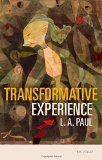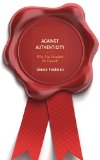December 31, 2014

Transformative Experience by L.A. Paul (Oxford University Press, 2015)
(kindle ed.), (amazon.co.uk), (UK kindle ed.)
Book description from the publisher:
As we live our lives, we repeatedly make decisions that shape our future circumstances and affect the sort of person we will be. When choosing whether to start a family, or deciding on a career, we often think we can assess the options by imagining what different experiences would be like for us. L. A. Paul argues that, for choices involving dramatically new experiences, we are confronted by the brute fact that we can know very little about our subjective futures. This has serious implications for our decisions. If we make life choices in the way we naturally and intuitively want to–by considering what we care about, and what our future selves will be like if we choose to have the experience–we only learn what we really need to know after we have already committed ourselves. If we try to escape the dilemma by avoiding an experience, we have still made a choice.
Choosing rationally, then, may require us to regard big life decisions as choices to make discoveries, small and large, about the intrinsic nature of experience, and to recognize that part of the value of living authentically is to experience one’s life and preferences in whatever way they may evolve in the wake of the choices one makes.
Using classic philosophical examples about the nature of consciousness, and drawing on recent work in normative decision theory, cognitive science, epistemology, and the philosophy of mind, Paul develops a rigorous account of transformative experience that sheds light on how we should understand real-world experience and our capacity to rationally map our subjective futures.
Google Books preview:
See also: Author’s website, Edge.org talk
Comments (0)
- cognitive science,new books,philosophy of mind
December 30, 2014

Guilt, Shame, and Anxiety: Understanding and Overcoming Negative Emotions by Peter R. Breggin (Prometheus Books, 2014)
(kindle ed.), (amazon.co.uk), (UK kindle ed.)
Book description from the publisher:
With the first unified theory of guilt, shame, and anxiety, this pioneering psychiatrist and critic of psychiatric diagnoses and drugs examines the causes and effects of psychological and emotional suffering from the perspective of biological evolution, child development, and mature adult decision-making. Drawing on evolution, neuroscience, and decades of clinical experience, Dr. Breggin analyzes what he calls our negative legacy emotions—the painful emotional heritage that encumbers all human beings. The author marshals evidence that we evolved as the most violent and yet most empathic creatures on Earth. Evolution dealt with this species-threatening conflict between our violence and our close-knit social life by building guilt, shame, and anxiety into our genes. These inhibiting emotions were needed prehistorically to control our self-assertiveness and aggression within intimate family and clan relationships.
Dr. Breggin shows how guilt, shame, and anxiety eventually became self-defeating and demoralizing legacies from our primitive past that no longer play any useful or positive role in mature adult life. He then guides the reader through the Three Steps to Emotional Freedom, starting with how to identify negative legacy emotions and then how to reject their control over us. Finally, he describes how to triumph over and transcend guilt, shame, and anxiety on the way to greater emotional freedom and a more rational, loving, and productive life.
Google Books preview:
See also: Author’s website
Comments (0)
- human evolution,new books,psychology
December 28, 2014

Against Authenticity: Why You Shouldn’t Be Yourself by Simon Feldman (Lexington Books, 2014)
(kindle ed.), (amazon.co.uk), (UK kindle ed.)
Book description from the publisher:
“Be true to yourself”—it is a dictum so ubiquitous that it can seem like both philosophical wisdom and an empty truism. Should we aspire to an ideal of living authentically? What does it mean to be true to yourself? Against Authenticity: Why You Shouldn’t Be Yourself is a philosophical exploration and critique of the ideal of authenticity. Simon Feldman argues that if being true to ourselves is a matter of maintaining a strong will, being psychologically independent, achieving self-knowledge, or being morally conscientious, then the best lives we can lead should be expected to involve substantial inauthenticity. Feldman suggests that various construals of the ideal of authenticity presuppose metaphysically confused notions of the self (for example, that there is a determinate “true self”) and that under the guise of indisputable wisdom the ideal perpetuates both objectionably relativistic as well as reactionary moral thinking. Feldman concludes that the ideal of authenticity is one that we would be better off abandoning, independent of our other moral or ethical commitments. With implications for every reader’s conception of authenticity and identity, Against Authenticity is an exciting challenge for students and scholars of ethics, metaethics, metaphysics, and moral psychology.
Google Books preview:
Comments (0)
- new books,self
December 26, 2014

Dancing to Learn: The Brain’s Cognition, Emotion, and Movement by Judith Lynne Hanna (Rowman & Littlefield, 2014)
(kindle ed.), (amazon.co.uk), (UK kindle ed.)
Book description from the publisher:
Dancing to Learn: Cognition, Emotion, and Movement explores the rationale for dance as a medium of learning to help engage educators and scientists to explore the underpinnings of dance, and dancers as well as members of the general public who are curious about new ways of comprehending dance. Among policy-makers, teachers, and parents, there is a heightened concern for successful pedagogical strategies. They want to know what can work with learners. This book approaches the subject of learning in, about, and through dance by triangulating knowledge from the arts and humanities, social and behavioral sciences, and cognitive and neurological sciences to challenge dismissive views of the cognitive importance of the physical dance. Insights come from theories and research findings in aesthetics, anthropology, cognitive science, dance, education, feminist theory, linguistics, neuroscience, phenomenology, psychology, and sociology. Using a single theory puts blinders on to other ways of description and analysis. Of course, all knowledge is tentative. Experiments necessarily must focus on a narrow topic and often use a special demographic—university students, and we don’t know the representativeness of case studies.
Google Books preview:
See also: Author’s website
Comments (0)
- cognitive science,culture






